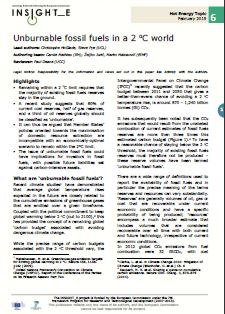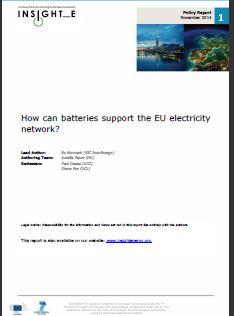Energy - Climate
In the face of the climate emergency and geopolitical confrontations, how can we reconcile security of supply, competitiveness, accessibility, decarbonization and acceptability? What policies are needed?
Related Subjects

The Saudi Electricity Sector: Pressing Issues and Challenges
With 266 billion barrels of proved oil reserves (16% of world total), Saudi Arabia holds the world's largest (conventional) crude oil reserves, was the largest exporter of total petroleum liquids in 2013, and the second largest petroleum liquids producer behind the United States[1].
Ifri’s conference on the New Frontiers of Energy Identified Strategic Orientations for the European Energy Union
The Ifri Center for Energy held its annual conference in Brussels on March 4th, 2015. The event gathered more than 150 participants, together with prominent policy makers, industry leaders and distinguished academics to discuss how the European energy policy can deliver effective results in light of geopolitical upheavals, technological developments and governance issues.
To download the presentations, click here
Energy Union: What's Inside the Defence Walls?
Conflicts in Ukraine and Middle East are giving resonance to the proposal for an Energy Union, originated by Poland, and, initiated by the European Commission. Indeed, access to affordable energy stands as a major concern for all EU citizens and becomes, as such, a strong political argument for the Juncker Commission to back-up an Energy Union.
Oil and Gas in Eastern Africa: Current Developments and Future Perspectives
The position of oil companies toward East Africa has changed considerably since 2006 when the first reserves in Uganda came to light. However, for many investors interested in the region, it remains difficult to get a clear picture of the scale of developments of this sector.

Volcanic Activity and Nuclear Security in Japan
At the beginning of 2014, Japan experienced the deadliest volcanic eruption on its territory in over a century. The unpredictable nature of the event reignited fears of the risks of nuclear power plants.

Unburnable fossil fuels in a 2 °C world
Lead Authors: Christophe McGlade, Steve Pye (UCL)
Authoring Team: Carole Mathieu (Ifri); Željko Jurić, Marko Matosović (EIHP)
Reviewer: Paul Deane (UCC)
The US Shale Oil Revolution: The Test of the Business Model is Underway
Since 2010, the United States has been undergoing a second shale revolution with the very rapid development of Light Tight Oil (LTO) or shale oil, following the revolution in shale gas. This development has allowed the production of oil and liquids to increase, so that the US is the world’s largest producer today, ahead of Saudi Arabia and Russia.
European Energy Security Challenges and Global Energy Trends: Old Wine in New Bottles?
Paper produced within the framework of the IAI-OCP Policy Center partnership and presented at the international seminar "Morocco's Role in Fostering Euro-Mediterranean Energy Cooperation" organised in Rabat on 26 September 2014.

How can Batteries support the EU Electricity Network?
Policy Report, Publication Insight_E
Lead Author: Bo Normark (KIC InnoEnergy), co-author: Aurélie Faure-Schuyer (Ifri),
Reviewers: Paul Deane (UCL) and Steve Pye (UCL)
Support independent French research
Ifri, a foundation recognized as being of public utility, relies largely on private donors – companies and individuals – to guarantee its sustainability and intellectual independence. Through their funding, donors help maintain the Institute's position among the world's leading think tanks. By benefiting from an internationally recognized network and expertise, donors refine their understanding of geopolitical risk and its consequences on global politics and the economy. In 2024, Ifri will support more than 70 French and foreign companies and organizations.















